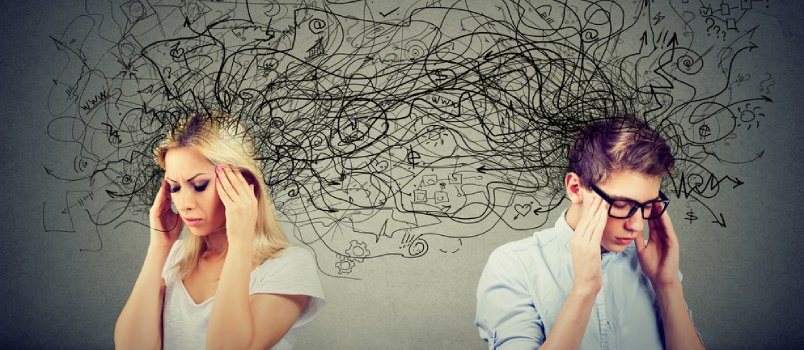ADHD, or Attention-Deficit/Hyperactivity Disorder, is a neurodevelopmental condition that affects millions of adults worldwide. While it presents challenges in various aspects of life, one of the most profound areas of impact can be on romantic relationships. Fortunately, ADHD marriage counseling is a valuable resource that can help couples address these challenges, improve their connection, and thrive together. In this blog, we’ll explore the world of ADHD marriage counseling, understanding its significance, process, and the benefits it brings to couples facing the unique dynamics of ADHD.
Contents
Understanding ADHD in Marriage

ADHD, often associated with children, is not something that disappears with age. Many adults live with this neurodevelopmental disorder, which affects their attention, impulsivity, and hyperactivity. When one partner in a marriage has ADHD, it can lead to misunderstandings, frustration, and feelings of neglect.
Recognizing the signs of ADHD in a marital context is the first step toward addressing the issue. Common signs may include forgetfulness, impulsiveness, difficulty with organization, and frequent distractions, all of which can strain a relationship.
Couples dealing with ADHD face unique challenges, such as communication breakdowns, emotional turbulence, and difficulty in sharing responsibilities. These challenges can lead to tension and conflict within the marriage.
The Importance of Seeking Counseling
Here are some reasons why seeking counseling is important:
- Mental Health Support: Counseling provides a safe and non-judgmental space for individuals to discuss their thoughts and feelings. It can help individuals cope with conditions such as depression, anxiety, bipolar disorder, and more. A trained therapist can offer strategies and tools to manage these conditions effectively.
- Emotional Well-being: Life can be overwhelming, and everyone experiences emotional challenges at some point. Counseling can help individuals process their emotions, develop emotional resilience, and enhance their overall emotional well-being.
- Relationship Issues: Counseling can be instrumental in resolving conflicts and improving communication in relationships, whether it’s with a partner, family member, friend, or coworker. Couples counseling, in particular, can help couples work through problems and strengthen their bond.
- Personal Growth: Counseling can assist individuals in gaining a deeper understanding of themselves, their values, and their goals. It can aid in personal development, enhance self-esteem, and promote a sense of purpose in life.
- Stress Management: In today’s fast-paced world, stress is a common issue. Counseling can teach individuals effective stress management techniques, helping them reduce stress-related health problems and improve their quality of life.
- Trauma Recovery: For those who have experienced trauma, counseling can be an essential part of the healing process. It helps individuals process and make sense of their traumatic experiences and develop strategies for moving forward.
Types of ADHD Marriage Counseling
Here are some common types of ADHD marriage counseling:
- ADHD-Informed Couples Counseling: In this type of counseling, therapists are trained to understand ADHD and its impact on relationships. They work with couples to address specific issues related to ADHD, such as impulsivity, forgetfulness, and disorganization. The focus is on improving communication and problem-solving skills within the relationship.
- Cognitive-Behavioral Therapy (CBT): CBT can be adapted for couples dealing with ADHD. It helps individuals with ADHD and their partners identify thought patterns and behaviors that contribute to relationship problems. CBT techniques can be used to develop coping strategies and improve communication.
- ADHD Coaching for Adults: Some individuals with ADHD benefit from working with an ADHD coach, who can help them develop practical strategies for managing symptoms in their daily lives. In the context of a marriage, an ADHD coach can work with both partners to implement strategies that support the individual with ADHD and the relationship as a whole.
- Medication Management and Counseling: For individuals with ADHD who are on medication, counseling can complement medication management. It can help couples understand the effects of medication, manage potential side effects, and address any concerns or misunderstandings about ADHD medications.
- Parenting Skills Training: If ADHD is present in one or more children in the family, parenting skills training can be a valuable component of counseling. This can help parents better understand and manage ADHD-related behaviors in their children, reducing stress and conflict within the marriage.
- Mindfulness-Based Approaches: Mindfulness techniques can be beneficial for managing the emotional impact of ADHD on relationships. Mindfulness practices can help individuals with ADHD and their partners become more present at the moment, reduce impulsivity, and improve emotional regulation.
- Support Groups: Joining a support group for couples dealing with ADHD can provide validation and a sense of community. Couples can share their experiences, learn from others facing similar challenges, and gain insights into effective coping strategies.
Benefits of ADHD Marriage Counseling

Here are some key advantages of seeking ADHD marriage counseling:
- Improved Understanding of ADHD: Counseling provides education about ADHD and its effects on individuals and relationships. Couples gain a better understanding of the condition’s symptoms, which can reduce misconceptions, blame, and frustration.
- Enhanced Communication: ADHD often leads to communication difficulties in relationships. Counseling equips couples with effective communication strategies that help them express their needs, listen actively, and understand each other better. Improved communication can reduce conflicts and misunderstandings.
- Conflict Resolution Skills: ADHD-related challenges can lead to frequent disagreements. Counseling teaches couples how to resolve conflicts constructively, focusing on finding mutually satisfactory solutions rather than escalating disputes.
- Coping Strategies: ADHD marriage counseling provides couples with practical coping strategies for managing ADHD symptoms. These strategies can include time management techniques, organizational skills, and methods to reduce impulsivity, all of which can benefit both partners.
- Emotional Regulation: Individuals with ADHD may struggle with emotional regulation. Counseling helps individuals and couples develop emotional regulation skills, reducing impulsive reactions and emotional outbursts.
- Enhanced Intimacy: ADHD can affect intimacy in a relationship, but counseling can help couples reconnect emotionally and physically. By addressing underlying issues and fostering understanding, couples can rebuild intimacy.
Finding the Right Counselor
Finding the right counselor or therapist is a crucial step in getting the support you need for your mental, emotional, or relational challenges. Here are some steps to help you find the right counselor:
- Identify Your Needs: Before you begin your search, take some time to clarify your specific needs and goals. Are you seeking individual therapy, couples counseling, family therapy, or group therapy? Do you have a particular issue or condition you’d like to address, such as depression, anxiety, trauma, or relationship problems? Understanding your needs will help you narrow down your search.
- Research Different Types of Counselors: There are various types of mental health professionals, including psychologists, psychiatrists, social workers, licensed professional counselors, marriage and family therapists, and more. Research the differences between these professionals to determine which one is best suited to your needs.
- Check Credentials: Verify the counselor’s credentials and licensure. They should be licensed to practice in your state or country and have the appropriate qualifications to address your specific concerns.
- Ask for Recommendations: Seek recommendations from trusted sources, such as friends, family members, or healthcare providers. They may be able to suggest counselors they’ve had positive experiences with.
- Online Databases: Use online resources to search for counselors in your area. Many professional organizations and therapy directories provide databases of licensed counselors, along with their specialties and contact information.
- Read Reviews: Online reviews and testimonials can offer insight into a counselor’s approach, personality, and effectiveness. Keep in mind that individual experiences can vary, so take reviews with a grain of salt.
The Counseling Process for ADHD
The counseling process for Attention-Deficit/Hyperactivity Disorder (ADHD) typically involves a series of steps aimed at helping individuals with ADHD better understand their condition, develop coping strategies, and improve their overall well-being. Here is an overview of the counseling process for ADHD:
- Initial Assessment:
- The counseling process typically begins with an initial assessment or intake session. During this session, the counselor gathers information about the individual’s history, symptoms, and any specific concerns related to ADHD.
- The counselor may use diagnostic criteria from the Diagnostic and Statistical Manual of Mental Disorders (DSM-5) to assess whether the individual meets the criteria for ADHD.
- Goal Setting: Once the assessment is complete, the individual and the counselor work together to establish clear and specific goals for counseling. These goals should address the individual’s unique challenges and needs related to ADHD.
- Psychoeducation: Psychoeducation is a fundamental component of ADHD counseling. The counselor provides information about ADHD, including its symptoms, causes, and impact on daily life. This helps individuals and their families gain a better understanding of the condition.
- Treatment Planning: Based on the assessment and goals, the counselor collaborates with the individual to develop a personalized treatment plan. This plan outlines the strategies and interventions that will be used to address ADHD-related challenges.
Tips for Managing ADHD in Marriage

Here are some tips for managing ADHD in marriage:
- Education and Awareness: Both partners should educate themselves about ADHD, its symptoms, and its impact on behavior, emotions, and relationships. Understanding the condition is crucial for empathy and effective communication.
- Open and Honest Communication: Encourage open and honest communication about ADHD-related challenges. Create a safe space where both partners can express their thoughts, concerns, and feelings without judgment.
- Set Realistic Expectations: Recognize that ADHD can affect various aspects of life, including organization, time management, and impulsivity. Set realistic expectations for each other, taking into account the challenges posed by ADHD.
- Structure and Routine: Establish routines and structure in daily life. Consistent schedules and clear routines can help individuals with ADHD manage their time and responsibilities more effectively.
Conclusion
ADHD marriage counseling is a beacon of hope for couples facing the unique challenges posed by ADHD. It offers the opportunity to rebuild trust, enhance communication, and reignite the flame of love. Don’t let ADHD strain your marriage; take the first step towards a healthier, happier relationship.
Remember, seeking help is a sign of strength, and with the right support, you can navigate the challenges of ADHD in your marriage successfully.
If you are experiencing ADHD related problems, Online ADHD Counseling at TherapyMantra can help: Book a trial Online therapy session.


